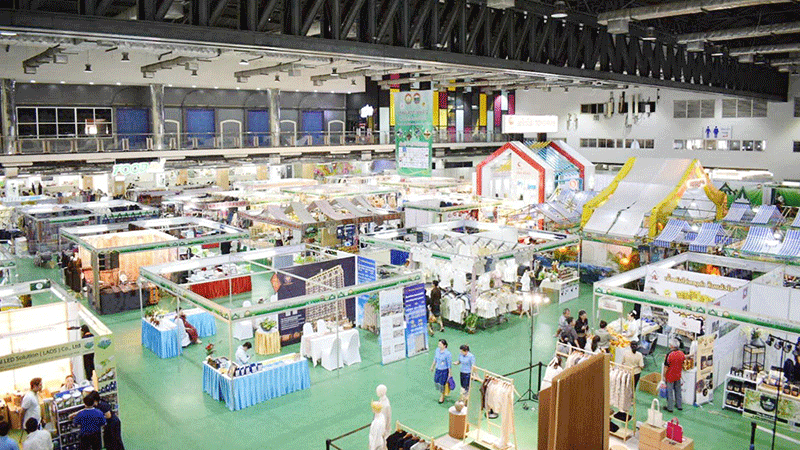 |
| Visitors explore products and services showcased by MSMEs at the Made in Laos 2025 fair in Vientiane. |
Vice President calls for more support for MSMEs as drivers of economic growth
The Vice President has called on the Ministry of Industry and Commerce to strengthen the business environment and expand access to finance for Micro, Small and Medium Enterprises, enabling them to become a main pillar of the economy.
Speaking at the 6th Party Congress of the Ministry of Industry and Commerce on October 28, Vice President Mrs Pany Yathotou stressed the need to reform administrative systems, simplify business procedures, and ensure transparency, to create a more supportive environment for small business operators.
She said MSMEs should be prioritised in national development, with clear mechanisms to help them access capital from financial institutions, strengthen competitiveness, and create more jobs for Lao nationals.
According to a World Bank report titled “Unlocking Finance for Micro, Small and Medium-sized Enterprises”, MSMEs are the backbone of the Lao economy, providing about 82 percent of total employment in 2018.
Despite this, the sector continues to face major challenges, especially limited access to finance and high levels of informality. Most MSMEs are engaged in trade (61 percent), services (18 percent), and manufacturing (15 percent), but many rely on self-funding because banks have reduced lending to small businesses.
Although total commercial bank credit in Laos increased from 31 percent of GDP in 2012 to 60 percent in 2022, the share of loans issued to MSMEs has declined as banks have shifted their focus to government projects and large corporations.
The World Bank said high collateral requirements, which often exceed 200 percent of a loan’s value, and a lack of formal financial records, are major obstacles preventing MSMEs from obtaining credit.
Deputy Director of the Nyoby Bank, Mr Bounxord Fongsanith, told the Vientiane Times that many MSMEs struggle to secure loans because their business plans are weak and their accounting systems are poorly managed.
“The accounting, tax and VAT records of most businesses are not systematic, which makes financial institutions hesitant to provide credit,” he said.
Mrs Pany also said that state-owned enterprises must be better regulated so they operate efficiently and profitably and play a stronger role in economic growth.
She said the industrial sector should focus on adding value to Lao products, especially through mineral and agricultural processing, while promoting clean industries with export potential.
She also highlighted the need to encourage the production of import-substitution goods and limit the export of unprocessed minerals to protect the environment.
Trade management, she noted, should be transparent and well-organised, with more done to promote Lao-made products and stabilise market prices.
The Vice President also called for stronger internal Party work by enhancing political awareness, patriotism, and discipline among staff, ensuring all officials meet the “3 Goods” standard—being good advisers, coordinators, and service providers.
Inspection and anti-corruption work must be intensified through the use of digital tools to reduce loopholes for misconduct, with disciplinary measures applied strictly and fairly, she added.
By Times Reporters
(Latest Update October 31, 2025)
|


